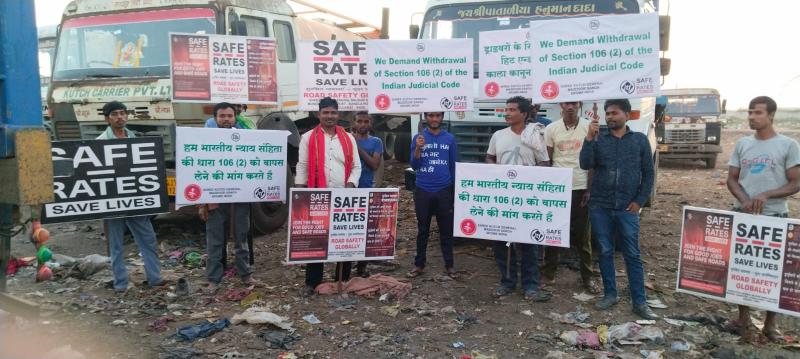With 50 ratifications of ILO Convention 190, it’s time to reflect on this milestone.
Six years since the historic adoption of the International Labour Organization’s Violence and Harassment Convention, 2019 (No. 190), the global movement to end violence and harassment in the world of work has reached a powerful milestone: 50 ratifications. This moment marks not only the growing consensus that safety, dignity, and respect are foundational to decent work, but also the real, measurable progress that C190 has made possible in transforming laws, policies, and practices to protect workers everywhere.
C190 is more than a legal tool. It has made workers feel seen, validated their experiences, and sparked a shift in our collective consciousness. For many, it has also opened a path toward healing and solidarity.
We can all be proud of what we’ve won together. This progress hasn’t come easily. For decades, the world of work has been shaped by deepening inequalities, economic instability, and escalating attacks on labour rights and democratic freedoms. The pandemic, the rise of the far right, and growing uncertainty about the future of work have only intensified these pressures — making our commitment for dignity and safety at work more urgent than ever.
Reaching 50 ratifications is not just a technical milestone — it is a powerful sign of our collective commitment to building a better world of work, even in times that test our solidarity.
From commitment to change — C190 in action
C190 and its accompanying Recommendation 206 (R206) are reshaping how we understand, prevent, and address violence and harassment at work – especially its links to discrimination, equality, and occupational safety and health.
The Convention protects all people in the world of work. In just six years the convention has driven a host of reforms to legal frameworks. These range from extended protection to interns, apprentices, and informal economy workers, to recognising violence and harassment as an occupational safety and health risk. Countries are taking measures to stop online violence and harassment, mitigate the impacts of domestic violence, and strengthen labour inspection systems.
The Maritime Labour Convention was recently amended to align with C190 – a major achievement. Labour inspectors and judges have received training. Employers have new tools and guidance, including ILO’s training hub and manuals.
Collective bargaining is also proving a key tool to secure stronger protections for workers. ILO research found 252 clauses on violence and harassment across 95 agreements in 15 countries – extending protections even to domestic and platform workers.
Ratification is only the start
Governments are at different stages of engaging with C190. Some have ratified and moved quickly to align national laws, policies and practice. Others are at the early stages of ratification or just beginning implementation. But ratification must never become a tokenistic, tick-box exercise. The real test is what comes next: how governments act on commitments, how employers make workplaces safe and inclusive, and how unions ensure a gender-transformative approach to bring workers’ voices – especially women – into decision-making.
Social dialogue between employers and unions is essential. Ratification alone does not guarantee change. What matters is implementation, employer accountability, and ensuring those most at risk – especially women and marginalised workers – are heard.
C190 does not stand alone. Core labour conventions like C155 on Occupational Safety and Health and C111 on Discrimination in Employment strengthen workers’ ability to demand safe, equal, respectful workplaces. This isn’t just good for workers – it’s good for business. Violence- and harassment-free workplaces are more productive, inclusive, and fair.
Six years after C190’s adoption, it’s time for all governments to follow through with ratification and effective implementation to make dignity at work a reality for all.
A high-risk sector needs a high-priority response
In transport – whether ports, aviation, road, rail, or maritime – workers face distinct risks of violence and harassment: remote and isolated work environments, unsafe commutes, unpredictable hours, and public interaction. In a sector long shaped by patriarchal norms, silence has often been the default.
That’s why C190 is so relevant. It names the problem, centres those most affected, and gives unions and workers a clear tool to demand change.
The ITF, representing 16.5 million transport workers in 150 countries, has seen both the power of C190 and the barriers to its full potential.
Unions are using C190 to negotiate workplace policies, organise women workers, and hold employers and governments accountable. In Ghana, the Maritime and Dockworkers’ Union secured a new HR policy with the Ghana Port and Harbor Authority – incorporating C190 language despite Ghana not yet ratifying.
This shows what’s possible when unions, and employers work together. It’s a reminder that the real impact comes when C190’s principles are embedded in everyday practice. These are not isolated wins – transport workers and their unions are using C190 to build safer workplaces and push for sectoral change.
Now is the time to push forward
As we mark 50 ratifications, we celebrate – but we also commit to organise. Because every new ratification must bring real change. Because C190 empowers us, even in countries that haven’t ratified. Governments must do more than sign treaties – they must act to ensure no one is left behind. Employers must move from compliance to commitment, adopting gender-transformative policies for all.
50 ratifications prove that change is possible, but ending violence and harassment at work takes more than ratification. It requires confronting systems and behaviours that perpetuate it – and maintaining awareness, vigilance and action.
The ILO will keep supporting ratification and implementation through research, training, and technical support to its constituents, and together unions, employers and governments must continue the momentum– to make safety, dignity, and equality a lived reality for every transport worker.
Let’s deliver on the promise of Convention 190 — and build a world of work free from violence and harassment for all.
This piece was developed by the ITF Women’s Department, in collaboration with the ILO’s Gender Equality, Diversity and Inclusion Branch.



